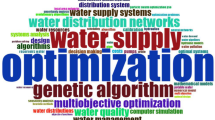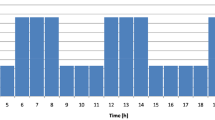Abstract
A sequential irrigation scheduling problem is the problem of preparing a schedule to sequentially service a set of water users. This problem has an analogy with the classical single machine earliness/tardiness scheduling problem in operations research. In previously published work, integer program and heuristics were used to solve sequential irrigation scheduling problems; however, such scheduling problems belong to a class of combinatorial optimization problems known to be computationally demanding (NP-hard). This is widely reported in operations research. Hence, integer program can only be used to solve relatively small problems usually in a research environment where considerable computational resources and time can be allocated to solve a single schedule. For practical applications, metaheuristics such as genetic algorithms (GA), simulated annealing, or tabu search methods need to be used. These need to be formulated carefully and tested thoroughly. The current research is to explore the potential of GA to solve the sequential irrigation scheduling problems. Four GA models are presented that model four different sequential irrigation scenarios. The GA models are tested extensively for a range of problem sizes, and the solution quality is compared against solutions from integer programs and heuristics. The GA is applied to the practical engineering problem of scheduling water scheduling to 94 water users.





Similar content being viewed by others
Abbreviations
- \( \overline{{D_{i - 1} }} \) :
-
Duration of the job preceding the job at the ith position in the jobs sequence
- \( \overline{{D_{j} }} \) :
-
Duration of job j
- E j :
-
Earliness of job j
- F :
-
Fitness function
- G :
-
Irrigation interval
- i :
-
Index of the job in the jobs sequence i = 1,2,3…J
- j :
-
Index of the job in the jobs sequence i = 1,2,3…J
- J :
-
Total number of outlets
- P I :
-
Penalty for irrigation interval violation
- P O :
-
Penalty for overlap of jobs
- R I :
-
Weighting for interval penalty
- R O :
-
Weighting for overlap penalty
- \( \overline{{S_{1} }} \) :
-
The scheduled start time of the earliest job in the sequence
- \( \overline{{S_{i} }} \) :
-
Scheduled start time of the job at the ith position in the jobs sequence
- S i−1 :
-
Scheduled start time of the job preceding the job at the ith position in the jobs sequence
- S int :
-
Start time of the irrigation interval
- S j :
-
An element of the scheduled start time row vector
- t :
-
Time block index = 1, 2…T
- T :
-
Total number of time blocks
- T j :
-
Tardiness of job j
- Z IP :
-
Value of objective function of the IP
- Z GA :
-
Value of objective function of the GA
- Z H :
-
Value of objective function of the heuristic
- α j :
-
Cost of earliness per unit of time for job j
- β j :
-
Cost of tardiness per unit of time for job j
- εIP :
-
Relative error of the GA to the IP
- εH :
-
Relative error of the heuristic to the IP
- δ j :
-
Binary variable
- λ j :
-
Binary variable
- ψ tj :
-
Binary variable
References
Anwar AA, De Vries TT (2004) Irrigation scheduling II: heuristics approach. J Irrigation Drainage Eng ASCE 130(1):17–25
Baker KR, Scudder GD (1990) Sequencing with earliness and tardiness penalties: a review. Oper Res 38(1):22–36
Bishop AA, Long AK (1983) Irrigation water delivery for equity between users. J Irrigation Drainage Eng ASCE 109(4):349–356
Cheng R, Gen M, Tsujimura Y (1996) A tutorial survey of job-shop scheduling problems using genetic algorithms-1. Representation. Comput Ind Eng 30(4):983–997
Clemens AJ (1987a) Delivery system schedules and required capacities. In: Planning, operation, rehabilitation and automation of irrigation water delivery systems: proceedings of a symposium, ASCE, USA, pp 18–34
Clemens AJ (1987b) Arranged delivery schedules. In: Planning, operation, rehabilitation and automation of irrigation water delivery systems: proceedings of a symposium, ASCE, USA, pp 57–67
Coello CAC (2002) Theoretical and numerical constraint-handling techniques used with evolutionary algorithms: a survey of the state of the art. Comput Methods Appl Mech Eng 191:1245–1287
Coley DA (1999) An introduction to genetic algorithms for scientists and engineers. World Scientific Publishing Co. Pte. Ltd, Singapore
Colin EC, Quinino RC (2005) An algorithm for insertion of idle time in the single machine scheduling problem with convex cost functions. Comput Oper Res 32:2285–2296
Conway RW, Maxwell WL, Miller LW (1967) Theory of Scheduling. Addison-Wesley, Reading
Dadios EP, Ashraf J (2006) Genetic algorithm with adaptive and dynamic penalty functions for the selection of cleaner production measures: a constrained optimization problem. Clean Tech Environ Policy 8:85–95
Davis L (1991) A handbook of genetic algorithms. Van Nostrad Reinhold, New York
De Vries TT, Anwar AA (2004) Irrigation scheduling I: integer programming approach. J Irrigation Drainage Eng ASCE 130(1):9–16
De Vries TT, Anwar AA (2006) Irrigation scheduling with travel times. J Irrigation Drainage Eng ASCE 132(3):220–227
Garey MR, Tarjan RE, Wilfong GT (1988) One-processor scheduling with symmetric earliness and tardiness penalties. Math Oper Res Inf 13(2):330–348
Goldberg DE (1989) Genetic algorithms in search, optimization and machine learning. Addison-Wesley Publishing Co., Inc., Redwood City
Heady RB, Zhu Z (1998) Minimizing the sum of job earliness and tardiness in a multimachine system. Int J Prod Res 36:1619–1632
Holland JH (1975) Adaptation in natural and artificial systems. University of Michigan Press, Ann Arbor
Kanet JJ, Sridharan V (2000) Scheduling with inserted idle time: problem taxonomy and literature review. Oper Res Inf 48(1):99–110
Lee CY, Choi JY (1995) A genetic algorithm for job sequencing problems with distinct due dates and general early-tardy penalty weights. Comput Oper Res 22(8):857–869
Man KF, Tang KS, Kwong S (1996) Genetic algorithms: concepts and applications. IEEE Trans Industr Electron 43(5):519–534
Medaglia AL, Gutiérrez E (2006a) JGA: an object-oriented framework for rapid development of genetic algorithms. In: Rennard JP (ed) Handbook of research on nature inspired computing for economics and management. ISBN 1-59140-984-5 (hcover); ISBN 1-59140-985-3 (ebook)
Medaglia AL, Gutiérrez E (2006b) Applications of JGA to operations management and vehicle routing. In: Rennard JP (ed) Handbook of research on nature inspired computing for economics and management. ISBN 1-59140-984-5 (hcover); ISBN 1-59140-985-3 (ebook)
Merriam JL (1987a) Introduction to the need for flexibility and automation. In: Planning, operation, rehabilitation and automation of irrigation water delivery systems, proceedings of a symposium, ASCE, USA, pp 1–17
Merriam JL (1987b) Demand irrigation schedules. In: Planning, operation, rehabilitation and automation of irrigation water delivery systems: proceedings of a symposium, ASCE, USA, pp 68–71
Merriam JL, Styles SW, Freeman BJ (2007) Flexible irrigation systems: concept, design, and application. J Irrigation Drainage Eng 133(1):2–11
Pinedo M (2002) Scheduling: theory, algorithms and systems, 2nd edn. Prentice Hall, Englewood Cliffs
Replogle JA (1987) Irrigation water management with rotation schedules. In: Planning, operation, rehabilitation and automation of irrigation water delivery systems: proceedings of a symposium, ASCE, USA, pp 35–44
Whitley LD (1994) A genetic algorithm tutorial. Stat Comput 4(2):65–85
Xiaoyan Zhu X, Wilhelm WE (2006) Scheduling and lot sizing with sequence-dependent setup: A literature review. IIE Trans 38(11):987–1007
Acknowledgments
The authors would like to acknowledge financial support provided by the Embassy of the Kingdom of Netherlands, Islamabad, Pakistan, through Grant #22294 and also financial support provided through the United Nations University, Institute of Sustainability and Peace Grant# 600UU 848, which supported the revision of this manuscript and the practical application.
Author information
Authors and Affiliations
Corresponding author
Additional information
Communicated by J. Kijne.
Rights and permissions
About this article
Cite this article
Anwar, A.A., Haq, Z.U. Genetic algorithms for the sequential irrigation scheduling problem. Irrig Sci 31, 815–829 (2013). https://doi.org/10.1007/s00271-012-0364-y
Received:
Accepted:
Published:
Issue Date:
DOI: https://doi.org/10.1007/s00271-012-0364-y




